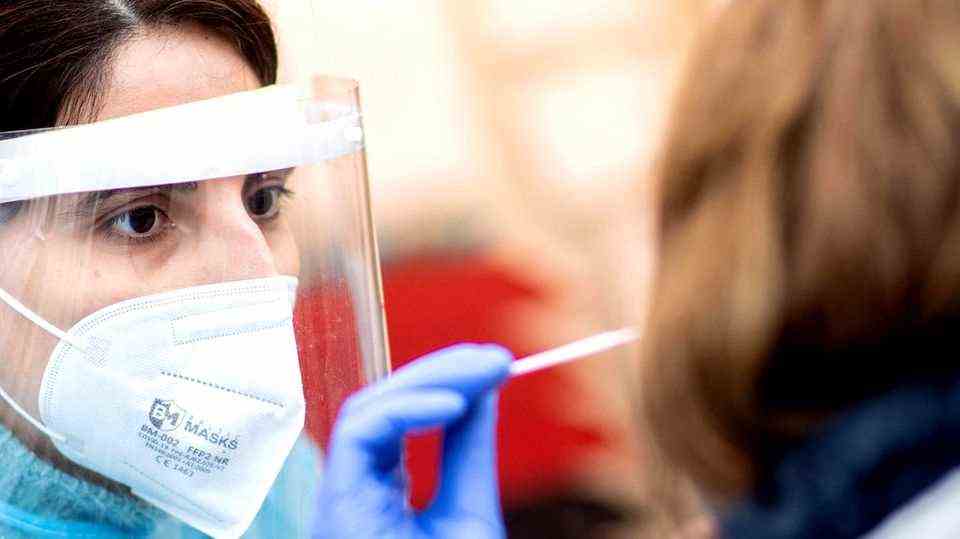Falling number of cases
Lauterbach explains a “real” decrease in the corona virus – but warns of the danger from Christmas
The new Health Minister Karl Lauterbach is promoting more booster vaccinations in view of the Omikron variant
© Bernd von Jutrczenka / DPA
Shortly before Christmas, the corona situation seems to relax a little. The number of cases is falling, fewer people come to the hospital. Karl Lauterbach and other experts warn against the Omikron variant.
At first glance, that’s good news: The fourth corona wave seems to be flattening out a bit. In the past two weeks, the Robert Koch Institute (RKI) reported a significant decrease in the number of cases. The seven-day incidence fell from more than 450 at the end of November to 375 and the number of adult corona patients in intensive care units has also stabilized at just under 5000 in the past few days.
For the new Health Minister Karl Lauterbach, this is a step in the right direction. “The situation is slowly stabilizing and the decline in the number of cases is real,” he wrote on Twitter and at the same time issued a warning. Now the trend shouldn’t be jeopardized by Christmas. Since the number of cases is still far too high, the booster campaign must be stepped up, according to Lauterbach. He is not alone in this.
Falling numbers due to vaccination progress and 2G
The epidemiologist Gérard Krause from the Helmholtz Center for Infection Research (HZI) in Braunschweig also assumes that the situation will actually ease. “This is mainly due to advances in vaccination and 2G,” he says. On the one hand, 2G rules are an incentive for unvaccinated people to be immunized. On the other hand, this rule would mean that non-immunized people would come into contact with the virus less often. In Germany, unvaccinated people are now excluded from many areas due to 2G rules. In addition, some Christmas markets have been banned, pubs and clubs have been closed. In the hard hit Saxony, there are rigid contact restrictions for unvaccinated people.
His colleague Hajo Zeeb from the Leibniz Institute for Prevention Research and Epidemiology in Bremen also speaks of a “positive development, even if there are uncertainties”. It has often been seen in the past that people have made their behavior more cautious in advance. “That could also contribute to this development before Christmas.”
Chief Medical Officer Ute Teichert puts it more cautiously: It is still difficult to assess whether there is a real decline in new infections or whether the values are still strongly characterized by an under-recording of the detected infections. “Presumably both are the case.”
Where Omikron has appeared everywhere
12 images
Experts warn of a new increase due to Omikron
The positive development could be short-lived anyway. The new Corona variant Omikron has not yet gained any significant foothold in Germany, says HZI researcher Krause. However, with a view to other countries, he assumes that this will change soon. “I fear that Omikron will lead to an increase in the number of infections again in two to three weeks at the latest, probably also in hospital admissions.”
Zeeb expert suggests a similar notch: “It remains to be seen how Omikron will work.” The absolute number of cases known is still very small. “But that can change quickly.” According to the data available so far, Omikron has a significantly higher transmission rate than the previously dominant Delta variant – probably because it also infects convalescents and vaccinated people more strongly. According to the RKI, there is still no reliable knowledge about the severity of the diseases caused by Omikron.
To arm Germany against Omikron, as many people as possible should be vaccinated and boosted, says Krause. “On the one hand, high immunity lowers the risk of being infected and seriously ill, but on the other hand it also lowers the likelihood of passing the virus on.” In addition, Krause advocates implementing the currently applicable measures more comprehensively, instead of adapting or questioning them at too short-term intervals. “That is important for acceptance.”
The easing that is currently emerging should not lead to the hasty lifting of measures. “The 2G rules should now be rigorously and consistently enforced in the long term until we can see which adjustments are required by Omikron,” says Krause. Epidemiologist Zeeb emphasizes that the tried and tested measures – “boosters, contact reduction, masks, etc.” – are also the right thing against Omikron.


